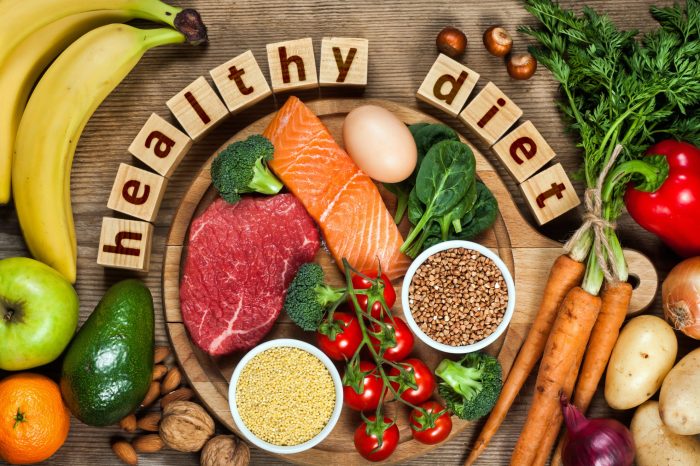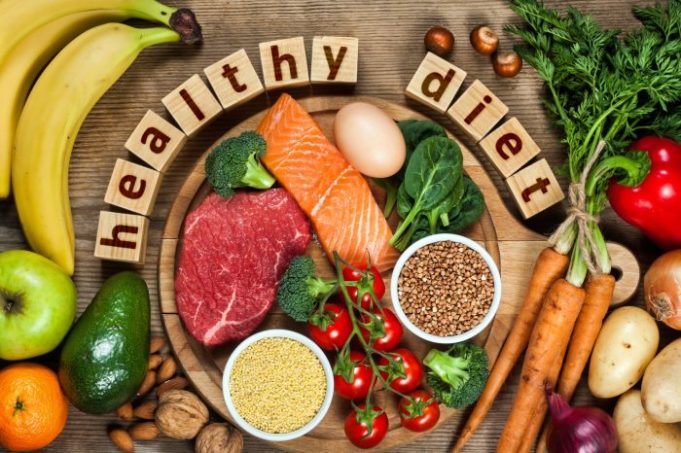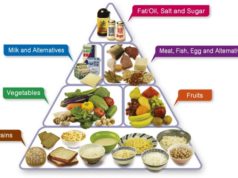The best way to diet isn’t about quick fixes or restrictive fads; it’s about building sustainable habits for long-term health. This guide delves into the science of healthy weight loss, exploring different dietary approaches, nutrition fundamentals, and lifestyle modifications that can help you achieve your goals. From understanding the difference between fad diets and sustainable methods to navigating the complexities of macronutrients and meal planning, this resource provides a comprehensive overview of the best way to diet for lasting results.
We’ll explore popular diets like the Mediterranean, DASH, and ketogenic, comparing and contrasting their effectiveness and potential drawbacks. We’ll also delve into the importance of regular physical activity, stress management, and mindful eating, emphasizing the interconnectedness of these elements in achieving sustainable weight loss.
Understanding Dieting: Best Way To Diet
Dieting is a common approach to weight loss, but it’s essential to understand the fundamentals of healthy weight loss to achieve sustainable results. It’s not just about restricting calories; it’s about making lasting lifestyle changes that support both physical and mental well-being.
Fundamentals of Healthy Weight Loss
Healthy weight loss involves creating a calorie deficit, meaning you consume fewer calories than you burn. This can be achieved through a combination of dietary changes and increased physical activity.
- Balanced Diet: Focus on consuming nutrient-rich foods, such as fruits, vegetables, whole grains, lean protein, and healthy fats. Limit processed foods, sugary drinks, and unhealthy fats.
- Portion Control: Be mindful of your portion sizes and avoid overeating. Use smaller plates, measure your food, and practice mindful eating.
- Regular Exercise: Aim for at least 150 minutes of moderate-intensity aerobic activity or 75 minutes of vigorous-intensity aerobic activity per week. Include strength training exercises at least twice a week.
- Hydration: Drink plenty of water throughout the day. Water helps you feel full, supports metabolism, and aids in digestion.
Fad Diets vs. Sustainable Approaches
Fad diets often promise rapid weight loss with restrictive rules and unrealistic claims. These diets are often unsustainable in the long term and can lead to nutritional deficiencies and rebound weight gain.
- Fad Diets: Examples include the ketogenic diet, the Atkins diet, and the grapefruit diet. These diets typically eliminate entire food groups or restrict calories drastically, which can be difficult to maintain and may lead to nutrient deficiencies.
- Sustainable Approaches: Focus on making gradual, long-term changes to your eating habits and lifestyle. They emphasize balanced nutrition, regular exercise, and mindful eating.
Setting Realistic Goals and Expectations
Setting realistic goals and expectations is crucial for successful weight loss. Aim for a gradual and sustainable weight loss of 1-2 pounds per week.
- Individualized Goals: Consult with a healthcare professional or registered dietitian to determine a safe and realistic weight loss goal based on your individual needs and circumstances.
- Focus on Lifestyle Changes: Instead of aiming for quick fixes, focus on making sustainable lifestyle changes that you can maintain over time. This includes incorporating healthy eating habits and regular physical activity into your daily routine.
- Celebrate Progress: Acknowledge your achievements along the way. Celebrate milestones, no matter how small, to stay motivated and maintain your commitment to your goals.
Dietary Approaches

Choosing the right dietary approach is crucial for achieving your health and weight management goals. Several popular diets have gained prominence for their effectiveness and potential benefits. This section delves into the details of some of these popular dietary approaches, highlighting their pros and cons, and the role of macronutrients in weight management.
Mediterranean Diet
The Mediterranean diet emphasizes consuming a variety of fruits, vegetables, whole grains, legumes, nuts, and seeds. It includes moderate amounts of fish, poultry, and dairy products, while limiting red meat, processed foods, and sugary drinks.
The Mediterranean diet is known for its numerous health benefits. It is rich in antioxidants, fiber, and healthy fats, which can contribute to improved heart health, reduced risk of type 2 diabetes, and better cognitive function. Studies have shown that individuals following a Mediterranean diet tend to have a lower body mass index (BMI) and reduced risk of obesity.
However, the Mediterranean diet can be challenging to follow consistently, especially for individuals with busy lifestyles or limited access to fresh produce.
DASH Diet
The DASH (Dietary Approaches to Stop Hypertension) diet is specifically designed to lower blood pressure. It emphasizes fruits, vegetables, whole grains, low-fat dairy products, and lean protein sources. It limits saturated and trans fats, cholesterol, and sodium.
The DASH diet has been proven effective in lowering blood pressure and reducing the risk of cardiovascular diseases. It also promotes weight loss and overall health.
The DASH diet can be challenging for individuals who are accustomed to high-sodium diets or have limited access to fresh produce.
Ketogenic Diet
The ketogenic diet is a high-fat, low-carbohydrate diet that forces the body to enter a state of ketosis, where it burns fat for energy instead of glucose. This diet typically consists of 70-80% fat, 20-25% protein, and 5-10% carbohydrates.
The ketogenic diet has shown promise in weight loss, reducing seizures in individuals with epilepsy, and improving blood sugar control in people with type 2 diabetes. However, it can lead to side effects like fatigue, constipation, and nutrient deficiencies.
Macronutrients and Weight Management
Macronutrients play a crucial role in weight management. Carbohydrates, proteins, and fats provide energy to the body.
Carbohydrates are the body’s primary source of energy. They are broken down into glucose, which is used by cells for fuel. Excessive carbohydrate intake can lead to weight gain, while limiting carbohydrates can aid in weight loss.
Proteins are essential for building and repairing tissues, as well as producing enzymes and hormones. They are also involved in satiety, which can help with weight management.
Fats provide energy and are essential for hormone production, cell function, and insulation. While fats are necessary, consuming excessive amounts can contribute to weight gain.
The optimal ratio of macronutrients for weight management varies depending on individual factors such as age, activity level, and health goals. Consulting a registered dietitian or a healthcare professional can help determine the best macronutrient ratio for your specific needs.
Nutrition and Food Choices
Making informed choices about what you eat is a cornerstone of successful dieting. It’s not just about restricting calories; it’s about nourishing your body with the right nutrients to support your health and well-being. This section delves into the importance of nutrient-dense foods and provides practical tips for making healthier substitutions in your daily meals and snacks.
Sample Meal Plan for a Healthy Diet
A healthy diet emphasizes whole, unprocessed foods, providing your body with the essential nutrients it needs to function optimally. Here’s a sample meal plan that aligns with a balanced and nutritious approach:
Breakfast
* Oatmeal with berries and nuts
* Scrambled eggs with whole-wheat toast and avocado
* Greek yogurt with fruit and granola
Lunch
* Salad with grilled chicken or fish and a variety of vegetables
* Whole-wheat sandwich with lean protein and vegetables
* Leftovers from a healthy dinner
Dinner
* Baked salmon with roasted vegetables
* Lentil soup with whole-wheat bread
* Chicken stir-fry with brown rice
Snacks
* Fruits (apple, banana, orange)
* Vegetables (carrots, celery, bell peppers)
* Nuts and seeds (almonds, walnuts, pumpkin seeds)
* Yogurt
Nutrient-Dense Foods to Prioritize and Limit
To fuel your body effectively, it’s crucial to understand the concept of nutrient density. Nutrient-dense foods provide a high amount of nutrients per calorie, offering essential vitamins, minerals, and fiber with minimal added sugars and unhealthy fats.
Prioritize Nutrient-Dense Foods
* Fruits and Vegetables: Rich in vitamins, minerals, fiber, and antioxidants. Aim for at least five servings daily.
* Whole Grains: Provide complex carbohydrates, fiber, and essential nutrients. Choose whole-grain bread, pasta, rice, and cereals.
* Lean Protein: Essential for building and repairing tissues. Include sources like chicken, fish, beans, lentils, and tofu.
* Healthy Fats: Support heart health and provide essential fatty acids. Choose avocados, nuts, seeds, olive oil, and fatty fish.
Limit Foods Low in Nutritional Value
* Processed Foods: Often high in calories, added sugars, unhealthy fats, and sodium. Avoid packaged snacks, fast food, and sugary drinks.
* Refined Grains: Lack fiber and other nutrients found in whole grains. Choose whole-grain options over white bread, rice, and pasta.
* Saturated and Trans Fats: Can increase the risk of heart disease. Limit intake from red meat, butter, and processed foods.
* Added Sugars: Contribute to weight gain, tooth decay, and other health issues. Reduce consumption of sugary drinks, desserts, and processed foods.
Tips for Healthier Substitutions
Making small changes to your eating habits can significantly impact your overall health and well-being. Here are some practical tips for making healthier substitutions in everyday meals and snacks:
* Swap white bread for whole-grain bread: Provides more fiber and nutrients.
* Use olive oil instead of butter: Offers heart-healthy monounsaturated fats.
* Choose grilled or baked chicken over fried chicken: Reduces saturated fat intake.
* Opt for fruits and vegetables as snacks instead of chips or candy: Provides essential vitamins, minerals, and fiber.
* Drink water instead of sugary drinks: Helps stay hydrated and reduces calorie intake.
* Substitute yogurt for sour cream: Provides probiotics and less fat.
* Replace refined grains with whole grains: Offers more fiber and nutrients.
Maintaining a Healthy Weight
Maintaining a healthy weight is crucial for overall well-being and can significantly reduce the risk of chronic diseases like heart disease, stroke, type 2 diabetes, and certain types of cancer. While losing weight can be challenging, maintaining a healthy weight after achieving your goals can be even more difficult. This section focuses on strategies for long-term weight management, emphasizing the importance of sustainable lifestyle changes and mindful eating habits.
Creating a Sustainable Lifestyle Plan, Best way to diet
Adopting a sustainable lifestyle plan involves making gradual and realistic changes to your eating habits and physical activity levels. This approach is more likely to lead to long-term success than quick fixes or fad diets.
- Set Realistic Goals: Aim for a gradual weight loss of 1-2 pounds per week. This rate is generally considered safe and sustainable. Avoid setting unrealistic goals, as they can lead to frustration and discouragement.
- Focus on Gradual Changes: Instead of drastically overhauling your diet and exercise routine, focus on making small, manageable changes that you can maintain over time. For example, start by incorporating more fruits and vegetables into your meals, gradually reducing your intake of processed foods and sugary drinks.
- Make Physical Activity a Habit: Aim for at least 150 minutes of moderate-intensity aerobic activity or 75 minutes of vigorous-intensity aerobic activity per week. Include strength training exercises at least twice a week. Remember, consistency is key. Find activities you enjoy and make them a regular part of your routine.
- Seek Support: Surround yourself with a supportive network of friends, family, or a professional like a registered dietitian or certified personal trainer. Their encouragement and guidance can help you stay motivated and accountable.
Preventing Weight Regain
Once you’ve reached your weight loss goals, it’s essential to implement strategies to prevent weight regain. This involves maintaining a healthy lifestyle and addressing potential triggers for weight gain.
- Maintain a Healthy Diet: Continue following a balanced and nutritious diet that includes plenty of fruits, vegetables, whole grains, and lean protein. Avoid processed foods, sugary drinks, and excessive amounts of saturated and unhealthy fats.
- Stay Active: Regular physical activity is crucial for maintaining a healthy weight. Aim for at least 30 minutes of moderate-intensity exercise most days of the week. Remember, staying active doesn’t necessarily mean hitting the gym. Find activities you enjoy, like walking, swimming, dancing, or gardening.
- Monitor Your Weight: Regularly weigh yourself to track your progress and identify any potential weight fluctuations. If you notice a significant weight gain, address it promptly by adjusting your diet and exercise routine.
- Be Mindful of Emotional Eating: Stress, boredom, or sadness can lead to emotional eating. Identify your triggers and develop healthy coping mechanisms for dealing with emotions without resorting to food. Consider activities like exercise, meditation, or spending time with loved ones.
- Manage Stress: Chronic stress can lead to weight gain by increasing cortisol levels, a hormone that promotes fat storage. Find healthy ways to manage stress, such as yoga, deep breathing exercises, or spending time in nature.
Mindful Eating and Portion Control
Mindful eating involves paying attention to your hunger and fullness cues, eating slowly, and savoring your food. It can help you prevent overeating and make healthier food choices.
- Listen to Your Body: Pay attention to your hunger and fullness signals. Eat when you’re truly hungry and stop when you’re satisfied, not stuffed.
- Eat Slowly: Take your time to chew your food thoroughly and savor each bite. This allows your body to register fullness signals more effectively.
- Avoid Distractions: Focus on your meal and avoid distractions like television, phones, or computers. This helps you pay attention to your food and eating habits.
- Practice Portion Control: Use smaller plates and bowls to help you control portion sizes. Avoid eating directly from the container, as it can lead to overconsumption.
- Be Aware of Serving Sizes: Familiarize yourself with standard serving sizes for different foods. This can help you make informed choices about portion control.
Epilogue
Ultimately, the best way to diet is the one that aligns with your individual needs, preferences, and lifestyle. This guide serves as a roadmap, providing you with the knowledge and tools to make informed choices about your dietary journey. Remember, it’s not about perfection, but about progress. By incorporating healthy habits into your life, you can achieve a healthier weight and a more fulfilling relationship with food.
Question & Answer Hub
What are some common diet mistakes to avoid?
Skipping meals, restricting entire food groups, and relying solely on supplements are common diet mistakes that can hinder progress and negatively impact your health.
Is it necessary to count calories when dieting?
While calorie counting can be helpful for some, it’s not essential for everyone. Focusing on nutrient-dense foods and mindful eating can be just as effective for weight loss.
How can I stay motivated on my weight loss journey?
Set realistic goals, track your progress, celebrate milestones, and find support from friends, family, or a healthcare professional.
Finding the best way to diet can be tricky, as it’s not just about restricting food. It’s about understanding what a “diet” truly means, beyond just calories and macros. To truly understand what a diet is, you need to delve into the bigger picture – what does diet mean.
Once you grasp the concept, you can then focus on sustainable lifestyle changes that work for you, making the best way to diet a journey towards a healthier, happier you.
The best way to diet is to find a plan that works for you and your lifestyle. Some people find that cutting out sugar and processed foods is the most effective way to lose weight, while others prefer to focus on eating whole, unprocessed foods.
If you’re considering the keto diet, you might wonder can you drink diet soda on keto. Ultimately, the best way to diet is to make sustainable changes that you can stick with long-term.
Finding the best way to diet can be a challenge, especially when considering your health and the health of your little one. If you’re breastfeeding, it’s important to focus on a balanced and nutritious diet that provides the nutrients you and your baby need.
For tips on finding the best diet when breastfeeding , you can check out this helpful resource. Remember, a healthy diet during breastfeeding can support both your well-being and your baby’s growth and development.
























